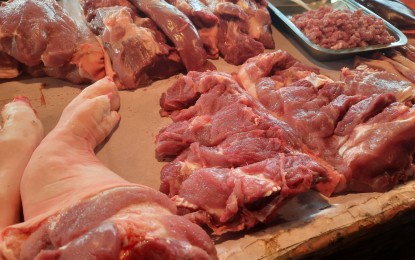
MANILA – The chairman of the House Ways and Means Committee on Thursday urged President Rodrigo Duterte to reconsider his decision to temporarily reduce import duties on pork as the government stands to lose PHP1.9 billion in revenues, which could be used to develop the local industry instead.
Albay Rep. Joey Salceda said while he agrees that action is needed to lower meat inflation, he believes that lowering pork tariffs will harm the domestic industry while primarily benefiting importers and traders.
Duterte issued Executive Order (EO) 128, which reduces tariff rates for both in-quota and out-quota imports of pork to boost pork supply in the country and tame prices of pork products.
Under EO 128, the in-quota or within the minimum access volume (MAV) for pork for the first three months upon effectivity will be 5 percent, while 15 percent for out-quota or outside MAV.
For the fourth to 12th months, in-quota would be 10 percent while out-quota will be 20 percent. The EO was intended to address the impact of African swine fever (ASF) on the country’s hog industry.
“The price differential between imported pork at around PHP190 after duties, and the domestic price of around PHP300-400 a kilo is enough incentive to import. What we need to do is ensure that imports that come in are safe and that the application process for the in-quota tariff rate is not tedious or expensive,” Salceda said.
Salceda said that the domestic industry suffers at a higher rate than the price level goes down with these adjustments.
“It’s naïve to think that traders will sell at lower prices just because imports are priced more cheaply. They are already pocketing up to 110 percent in gross margins. What would stop them from just taking more?” Salceda said. “While I support the overall policy of easing trade to lower consumer prices, we should have precautions to help domestic industry.”
He suggested using tariff revenues to improve the country’s swine repopulation program and invest in biosafety and better feeding.
“My problem here is that the domestic industry is not dominated by big businesses. When we hurt the domestic industry, we are hurting small backyard raisers, whose output comprises 71 percent of all swine production in the country,” Salceda said.
Salceda said that while the President has the power to lower tariffs during the congressional break, the House committee could have conducted hearings to hear all the stakeholders and come up with a mutually beneficial solution.
“Ordinarily, lowering tariffs is a power of Congress, that should specifically originate in my Committee. NEDA (National Economic and Development Authority) could have at the very least asked my Committee to clear the final decision, because they’re borrowing my Committee’s power. And it’s very hard to reverse decisions like these,” Salceda said.
Salceda said one viable alternative is to expand the MAV, whose tariff rate is 10 percent lower than the regular rate, and automatically approve imports as MAV on a first-come, first-served basis.
“We can simplify the procedure so that whoever comes first gets to use the MAV. That also saves importers money, because there are at least 3 trade barriers directly related to the MAV,” he said. “In the meantime, our policy with the domestic industry should be to do no further harm. We are not so generous with stimulus measures or aid. The least we can do is not to hurt our own sectors.”
Agriculture Secretary William Dar, in a joint virtual presser with the Department of Trade and Industry (DTI), on Wednesday said the government and other stakeholders are committed to stabilizing food prices by augmenting food supply.
They also ensure that the supply chains of goods, especially food, will be unhampered during the enhanced community quarantine in the 'National Capital Region Plus' area.
Measures to boost the supply of key agricultural commodities, including temporary reduction of tariff and quota controls, can help stabilize food prices and inflation, Dar said. (PNA)
